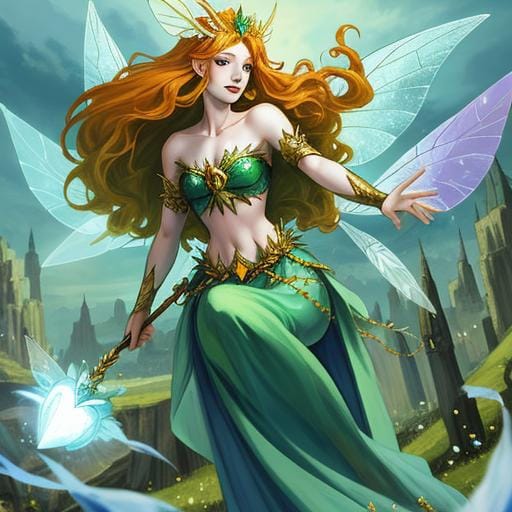Titania the Fairy Queen.


Titania, the Fairy Queen, is a powerful and enigmatic figure in the world of mythology and folklore. She is often depicted as a beautiful and ethereal queen, ruling over the realm of fairies and other magical creatures. Her name is derived from the Latin word "titania," meaning "great one," which reflects her status as a revered and respected figure in the fairy world. History and Origins The first mention of Titania can be found in William Shakespeare's play "A Midsummer Night's Dream," written in the late 16th century. In the play, she is the queen of the fairies and the wife of Oberon, the king of the fairies. Shakespeare drew inspiration from earlier sources, such as medieval English fairy lore and classical mythology, to create his version of Titania. However, the origins of Titania can be traced back even further, to ancient Greek and Roman mythology. In Greek mythology, she is known as Titania, daughter of the Titans and the sister of the powerful goddesses, Demeter and Hestia. In Roman mythology, she is known as Diana, the goddess of the hunt and the moon. Over time, these different mythologies and cultures blended together, creating the multifaceted and complex figure of Titania that we know today. Realm and Powers As the Fairy Queen, Titania rules over the realm of fairies, a world filled with magic, wonder, and enchantment. This realm is often described as a place of eternal summer, where the beauty of nature is at its peak. It is said that Titania's presence alone can bring about the blooming of flowers, the growth of trees, and the birth of new life. Titania is also believed to possess great powers and magical abilities. She is said to have control over the elements, able to summon storms and calm the seas. She is also a master of transformation, able to take on different forms and shapeshift at will. Her most famous power, however, is her ability to grant wishes and bestow blessings upon those who are deserving. Spiritual and Metaphysical Significance Titania holds great significance in the spiritual and metaphysical realm. In many belief systems, she is seen as a representation of the divine feminine, embodying qualities such as beauty, grace, and wisdom. She is also associated with the natural world and the cycles of life, death, and rebirth. In Wiccan and Pagan traditions, Titania is seen as a guardian of the earth and a protector of all living creatures. She is often invoked during rituals and ceremonies, particularly those that involve connecting with nature and harnessing its energies. Her presence is believed to bring about balance, harmony, and healing. In modern times, Titania has become a symbol of feminine strength and empowerment. She represents the idea that women are powerful and capable beings, capable of ruling and leading just as well as men. Her character has inspired countless works of art, literature, and music, cementing her place in popular culture and the collective consciousness. In conclusion, Titania, the Fairy Queen, is a fascinating and mysterious figure, steeped in history and mythology. She represents the beauty and magic of the natural world, as well as the power and resilience of the feminine spirit. Whether she is viewed as a literary character, a spiritual guide, or a symbol of empowerment, Titania continues to captivate and inspire people of all ages and backgrounds.
